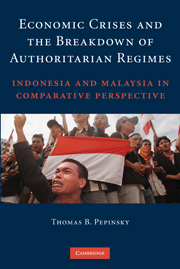 Economic Crises and the Breakdown of Authoritarian Regimes
Economic Crises and the Breakdown of Authoritarian Regimes Book contents
- Frontmatter
- Contents
- List of Tables
- List of Figures
- Acknowledgments
- Terms and Abbreviations
- 1 Crises, Adjustment, and Transitions
- 2 Coalitional Sources of Adjustment and Regime Survival
- 3 Authoritarian Support Coalitions: Comparing Indonesia and Malaysia
- 4 Adjustment Policy in Indonesia, June 1997–May 1998
- 5 Adjustment Policy in Malaysia, June 1997–December 1999
- 6 Authoritarian Breakdown in Indonesia
- 7 Authoritarian Stability in Malaysia
- 8 Cross-National Perspectives
- 9 Conclusions
- References
- Index
7 - Authoritarian Stability in Malaysia
Published online by Cambridge University Press: 21 January 2010
- Frontmatter
- Contents
- List of Tables
- List of Figures
- Acknowledgments
- Terms and Abbreviations
- 1 Crises, Adjustment, and Transitions
- 2 Coalitional Sources of Adjustment and Regime Survival
- 3 Authoritarian Support Coalitions: Comparing Indonesia and Malaysia
- 4 Adjustment Policy in Indonesia, June 1997–May 1998
- 5 Adjustment Policy in Malaysia, June 1997–December 1999
- 6 Authoritarian Breakdown in Indonesia
- 7 Authoritarian Stability in Malaysia
- 8 Cross-National Perspectives
- 9 Conclusions
- References
- Index
Summary
Malaysia's authoritarian regime survived the severe economic crisis that brought down Indonesia's New Order. Mahathir Mohamad retained firm control over Malaysia's political machine throughout Malaysia's crisis, even as contestation over Malaysia's political future rocked Malaysian society. In addition to implementing Malaysia's controversial capital controls and ringgit peg, Mahathir oversaw the arrest and conviction of his erstwhile deputy Anwar Ibrahim, as well as the regime's clampdown on a Malaysian reformasi movement. By December 1999 the BN had won its seventh election since 1969, easily retaining a two-thirds majority in the Dewan Rakyat (DR). Economic recovery through 1999 and 2000 reaffirmed UMNO's position at the top of Malaysia's political hierarchy. With the loyal and famously clean deputy prime minister Abdullah Ahmad Badawi prepared to succeed Mahathir on Mahathir's own terms, the stability of Malaysia's authoritarian regime was assured.
There are many existing explanations for the Malaysian regime's ability to withstand pressure for democratization. In this chapter, I argue that this political stability is the product of the regime's adjustment policies, which fulfilled the demands of each of its political supporters, poor Malays and the new Malay business class. Capital controls enabled expansionary policies, fulfilling the demands of fixed capital and the Malay masses. The effect of this radical adjustment measure for Malaysia's political opposition was striking. Having received their preferred adjustment policies, the regime's coalition of supporters had no incentive to withdraw support. So Malaysia's regime survived the crisis, despite the BN's most significant political challenge since the racial riots of 1969.
- Type
- Chapter
- Information
- Economic Crises and the Breakdown of Authoritarian RegimesIndonesia and Malaysia in Comparative Perspective, pp. 192 - 224Publisher: Cambridge University PressPrint publication year: 2009
- 2
- Cited by
